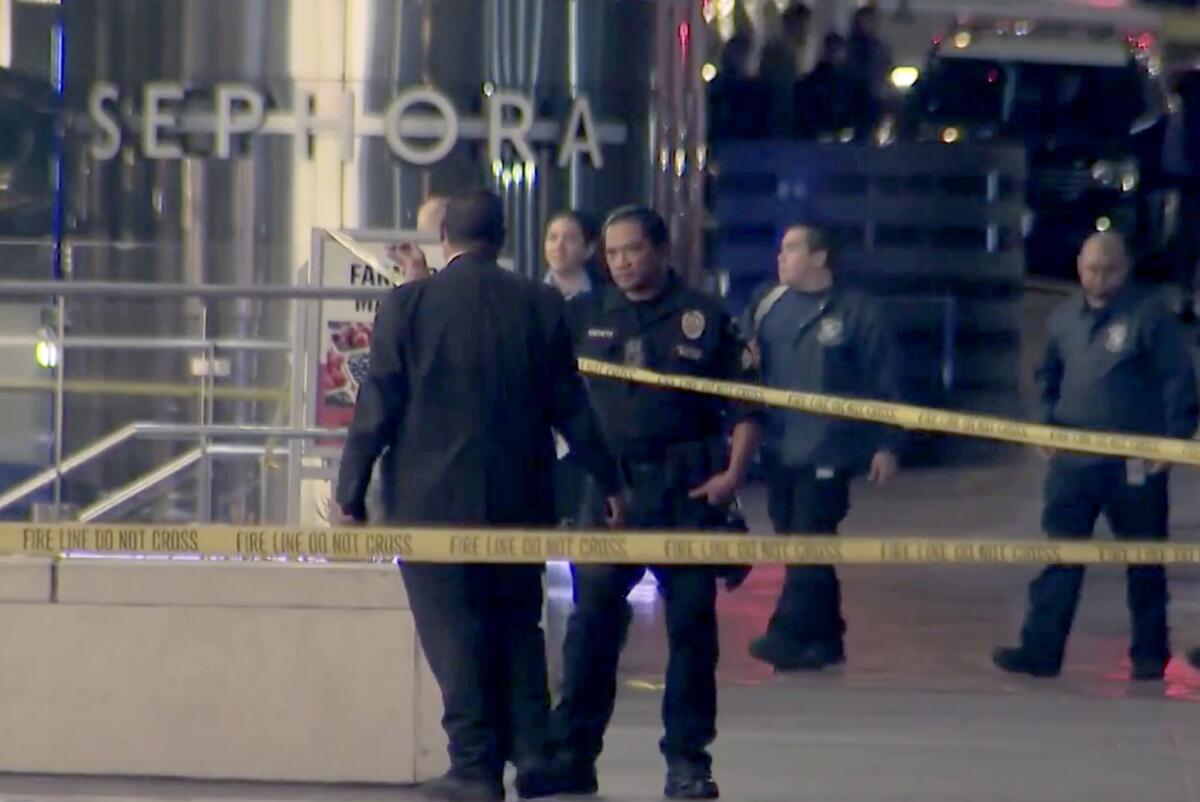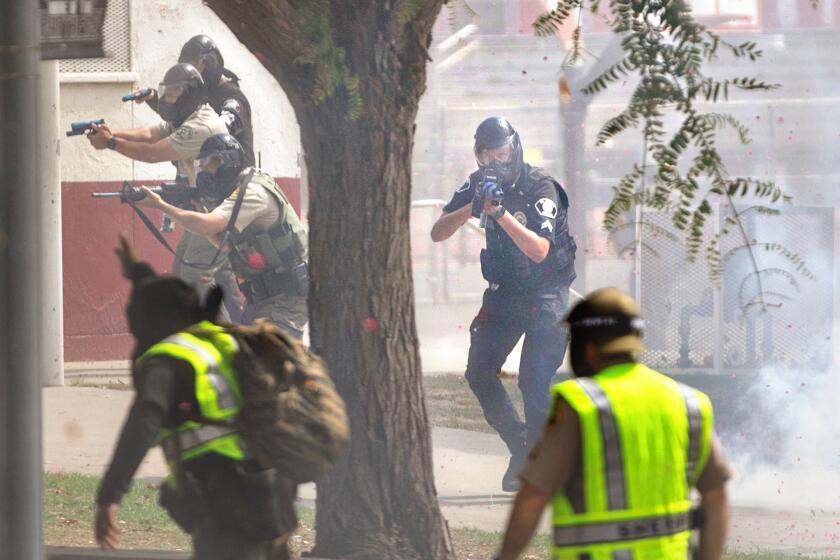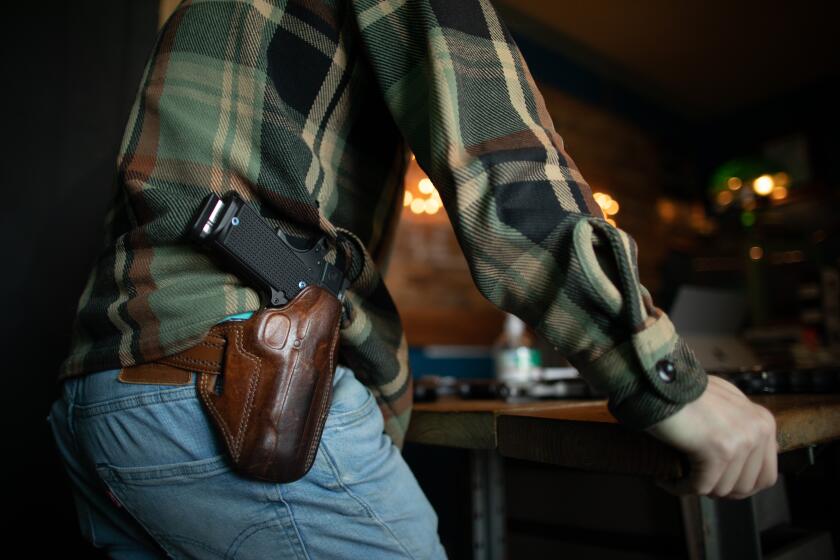California is poised to require employers to create workplace violence response plans

- Share via
California appears poised to require employers to take measures meant to prevent and respond to workplace violence after the state Legislature passed sweeping Senate Bill 553 on Tuesday.
The bill, which had met pushback from small business advocates, requires most employers to maintain a log of violent incidents and investigations, train employees on how to report incidents without fear of retaliation and allow any employee to petition for a restraining order, among other provisions.
What the bill does not include, however, is also noteworthy.
Gone from SB 553 is a requirement that employers implement active shooter training, as well as a controversial provision that prohibited businesses “from maintaining policies that require employees who are not dedicated safety personnel to confront active shooters or suspected shoplifters,” as was written in previous versions.
California Democrats approved a bill on Thursday to add an 11% excise tax on firearms manufacturers and dealers to help fund violence prevention programs and to bolster school safety.
“I’m grateful to my colleagues in the Legislature for standing up for workers and businesses at this time of rising workplace violence,” State Sen. Dave Cortese (D-San Jose), the bill’s lead author, said in a statement Tuesday morning. “This groundbreaking bill represents a lengthy negotiation and collaboration between business and labor organizations.”
The bill will now head to Gov. Gavin Newsom’s desk. Newsom has not taken a public position on the bill.
SB 553 initially passed the Senate on May 31 along a 29-8 party line vote and was amended on various occasions, including before its Sept. 1 passage through the Assembly Appropriations Committee.
On that day, Cortese announced that opposition to his bill, chiefly from the California Retailers Assn. and the California Chamber of Commerce, had been dropped.
Senate Bill 553 requires employers to implement active shooter training, and shoplifter training for retail workers. Opponents claim it risks the livelihood of small businesses.
“Given the recent amendments made, we’ve taken our opposition off and are now moving to neutral on this bill,” Ryan Allain, the California Retailers Assn.’s director of government affairs, said Tuesday morning.
California Retailers Assn. President Rachel Michelin previously said the bill needed to eliminate any wording that would require small businesses to hire either security or loss-prevention personnel.
“I’ve been talking to those small businesses and they told me they will absolutely close if they have to hire security,” Michelin told The Times in June. “They’re barely hanging on as it is.”
Cortese called the suggestion that the legislation had ever required hiring security guards “a falsehood that has been passed around too many times.”
“Those were some reckless remarks she made that needlessly scared small shop owners,” he said in a phone interview Tuesday evening.
The bill’s language prohibiting businesses from requiring untrained employees to confront shoplifters, which critics said would have required trained security or loss prevention, was removed.
Democrats send Gov. Gavin Newsom a bill to restrict who can obtain a concealed-carry permit in California, teeing up a possible Supreme Court fight.
Cortese also carved out an exemption for small businesses that employ 10 or fewer workers and are not generally open to the public. They join healthcare and corrections facilities, law enforcement agencies and telework employees who are all exempt from the new regulations.
All other businesses are required to: train workers on how to contact law enforcement or on-site staff assigned to respond to workplace violence, maintain and annually review injury and illness prevention plans, identify who’s responsible for training and protocols, develop plans to address employee violence concerns and create procedures on how to respond to violent emergencies, evacuations and sheltering plans.
The bill was spurred by an apparent lack of protocols in place prior to a mass shooting at a Santa Clara Valley light rail yard in 2021, Cortese said.
A disgruntled former rail employee killed nine co-workers before turning one of his three semiautomatic pistols on himself.
Cortese has also referred to rising violence at workplaces.
In December, the U.S. Bureau of Labor Statistics reported that workplace homicides increased more than 20% in 2021, the latest year for which data are available, to 481 deaths. That number topped the previous five-year high of 458 in 2017. Of those deaths, 387 involved a shooting. Cal/OSHA noted that the number of California workplace homicides in 2021 was 57, with 42 killed by guns.
Nonfatal workplace violence figures vary. The U.S. Department of Justice released a report last year that found, on average between 2015 and 2019, “1.3 million nonfatal violent crimes in the workplace occurred annually.” The Bureau of Labor Statistics reported 37,060 nonfatal workplace injuries in 2020 “resulting from an intentional injury by another person.”
Newsom will sign or veto hundreds of bills that California lawmakers must send him by Sept. 14.
As Cortese’s bill awaits the governor’s signature, the Division of Occupational Safety and Health, which regulates workplace safety in the state, is also considering standards and guidelines that include workplace violence prevention.
Cal/OSHA has been working on a plan since 2017 that was slowed due to the COVID-19 pandemic. The agency held three advisory meetings in 2017 and 2018, but only one since then.
Cortese’s staff has said, “SB 553 would accelerate the creation of this standard by placing it into effect on July 1, 2024.”
Cortese added that SB 553 would not be the last piece of legislation regarding worker safety.
“We’re going to keep doing this legislation going forward,” he said. “I’m laser focused on this issue.”
More to Read
Sign up for Essential California
The most important California stories and recommendations in your inbox every morning.
You may occasionally receive promotional content from the Los Angeles Times.


















